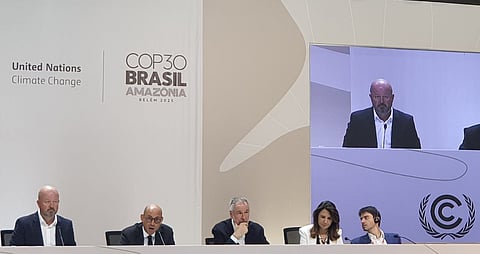

A compromise on agenda setting, without the so-called “agenda fight” was brokered on the first day of the two-week 30th Conference of the Parties (COP30) to the United Nations Framework Convention on Climate Change (UNFCCC) climate summit with four contentious items — including financial obligations of developed countries to the developing countries (Article 9.1) — being left out of the adopted agenda.
COP30 began in the Amazonian city of Belem in Brazil on November 10, with the United Nations Climate Change Executive Secretary Simon Stiell urging countries to cooperate rather than fight each other.
Eight new items were proposed to be added in the COP30 agenda, since the Bonn Climate Conference in June. Of these, four will be discussed during presidential consultations (which began immediately after the opening plenary) over the next day and a half. These are:
· Implementation of Article 9.1 of the Paris Agreement, which was proposed to be added in the agenda by Like Minded Developing Countries (LMDCs) bloc which includes India and is a top priority for developing countries and small island nations
· Promoting international cooperation and addressing the concerns with climate change related trade-restrictive unilateral measures
· Responding to the synthesis report on nationally determined contributions (NDCs) or climate goals and addressing the 1.5°C ambition and implementation gap
· Synthesis of biennial transparency reports (BTR), the main instrument through which Parties communicate progress toward their NDCs, as well as their greenhouse gas emissions, adaptation efforts, and support provided or received
The agenda items on the implementation of Article 9.1, which forms a cornerstone of climate finance and climate change related trade-restrictive unilateral measures, that hinder the capacity and ability of developing countries to meet their climate targets, were proposed by the bloc of Like-Minded Developing Countries (LMDCs) much earlier, during the 62nd session of the Subsidiary Bodies (SB62) in Bonn.
Furthermore, the synthesis report on NDCs and addressing the 1.5°C ambition and implementation gap was asked to be included in the agenda by the Alliance of Small Island States (AOSIS) in the last two weeks leading up to COP30, while the inclusion of synthesis of biennial transparency reports was asked by Denmark and European Union very recently.
COP30 President André Corrêa do Lago said that he would give an update on these discussions at a special “stock-taking plenary” to be held on November 12.
Some of the other four items like climate change and health will be included under the agenda item on adaptation, while there will be special events on others like mountains and climate change, with their outcomes being reflected in the final report.
“In this arena of COP30, your job here is not to fight one another, your job here is to fight this climate crisis together,” Stiell told delegates from more than 190 countries at the COP30 venue, which was lashed by heavy rain on November 10 afternoon.
COP30 Presidency convened discussions a day before, on November 9, to reach a common understanding over the agenda. While an “agenda fight” over what should be discussed in the next two weeks was averted on the first day, there was still uncertainty among delegates on the way forward.
A party delegate told Down To Earth that there was not enough clarity on what will happen after the Presidential Discussions end on November 12 and how these four additions can be included in the final outcome.
The Presidential discussions under the UNFCCC are informal, high-level negotiation spaces convened by the COP Presidency to help parties find political convergence on difficult or sensitive issues that could not be resolved in the formal negotiation tracks.
Responding to a question from the press about what solutions the Presidency is looking at after November 12 and if there can be a cover decision on the four items, André Corrêa do Lago said that “everything is open” for the moment. “Let’s wait for Wednesday. For the moment everything is open. We intend to develop a very intense series of consultations, and I hope on Wednesday we will have an interesting result.”
Most of the developing countries led by LMDCs emphasised that Article 9.1 of the Paris Agreement, which establishes the legal obligation of developed countries to provide financial resources to developing countries, is central to the current discussions and while discussions have focused on Article 9.3 through the New Collective Quantified Goal (NCQG), Article 9.1 has not been adequately addressed, resulting in the absence of assured finance flows.
The group also described unilateral trade measures as restrictive, unconsulted actions, particularly referring to EU’s measures such as Carbon Border Adjustment Mechanism and the Deforestation Regulation that unfairly penalise developing countries. The group, in response to some developed countries such as Japan and the EU further stated that the issue should not be solely confined to the World Trade Organization (WTO) and such multilateral environmental agreements (MEAs) must remain consistent and inclusive.
The Arab Group also called for a concrete plan to implement Article 9.1 with clear accounting and tripled finance flows, while strongly opposing unilateral trade measures that they said unfairly tax developing countries and undermine multilateralism.
On the contrary, Japan, Norway, and the EU agreed that Article 9.1 should be addressed within the broader context of Article 9 as a whole and the NCQG process, noting that developed countries are meeting their obligations while voluntary and private finance also play key roles. All three opposed discussing unilateral trade measures under the UNFCCC, arguing these are best handled under the WTO and existing forums to avoid duplication.
The COP Presidency enabled a common ground between the Parties based on the Presidential consultations on the four agenda items. Although it led to a smoother process of adopting the agenda, however, the status of actual progress on these items that bring clarity on how they will be reflected in the final outcome will unfold this Wednesday.